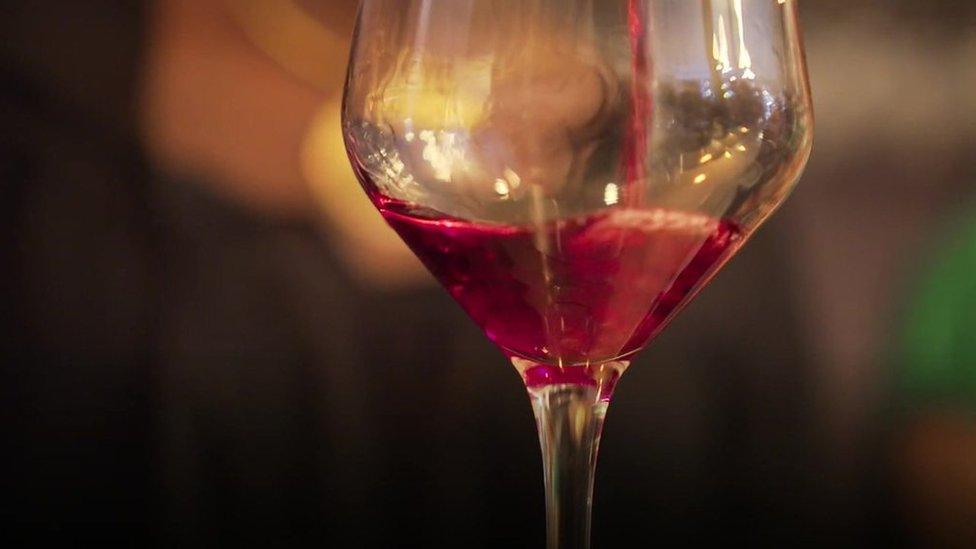Are themed bars and pubs the future?
- Published
At this new themed cocktail bar, magic wands are connected to the Internet of Things.
Although some British bars and pubs are struggling, others are thriving by offering customers new experiences. But is the alcohol industry shifting as a whole, or is this just a passing fad?
Themed experiential cocktail bars and pubs are on the rise in UK cities, and many are inspired by popular culture.
Venues typically offer customers costumes to put on and group activities.
On Wednesday, fantasy-inspired cocktail bar The Cauldron will open its second pop-up venue in London.
Millennials drink less
One reason for this trend has to do with changing consumer habits.
Millennials are less likely to drink than previous generations, according to market research firm Nielsen, external.
And people are more likely to drink at home - the NHS, external says that household spending on alcoholic drinks rose by 2.8% from 2013-2017.
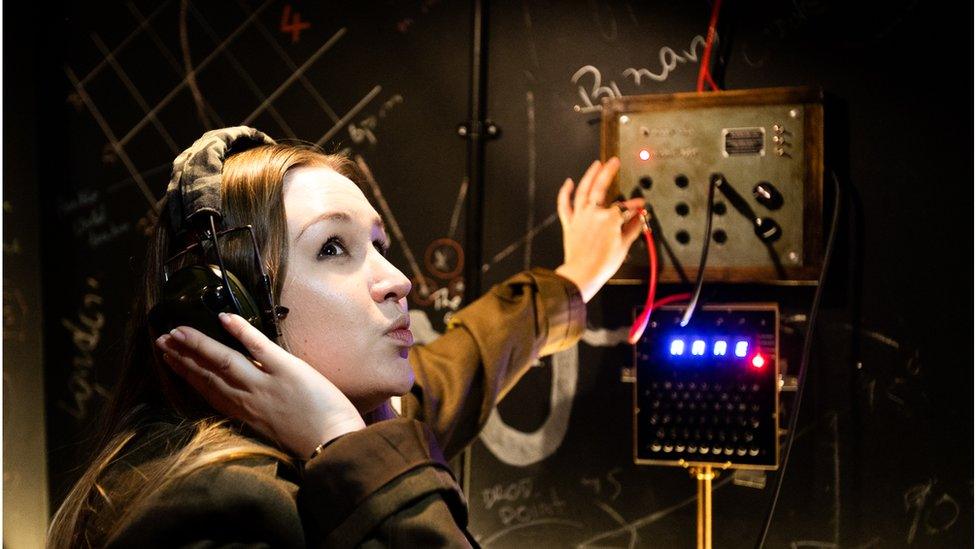
A customer solving a World War Two code puzzle at The Bletchley
But this doesn't mean that millennials - people born between 1981-1996 according to Pew Research Center, external - do not go out.
According to research firm Mintel, external, millennials seek unique experiences and new drinks.
Unlike previous generations, when they catch up with friends, drinking is no longer central to social bonding.
Many younger consumers no longer gravitate to the pub, and 22% of respondents told Mintel that more bars should offer some kind of activity.
'Fighting with technology'
Although venues are designed to be "Instagrammable" - places people want to photograph and share on social media - some are trying to get consumers to put their smartphones down.
"We're fighting with technology here - often when a group of young people visit a venue, they are all on their phones and they're not talking to each other," Sebastian Lyall, owner of a number of immersive cocktail bars tells the BBC.
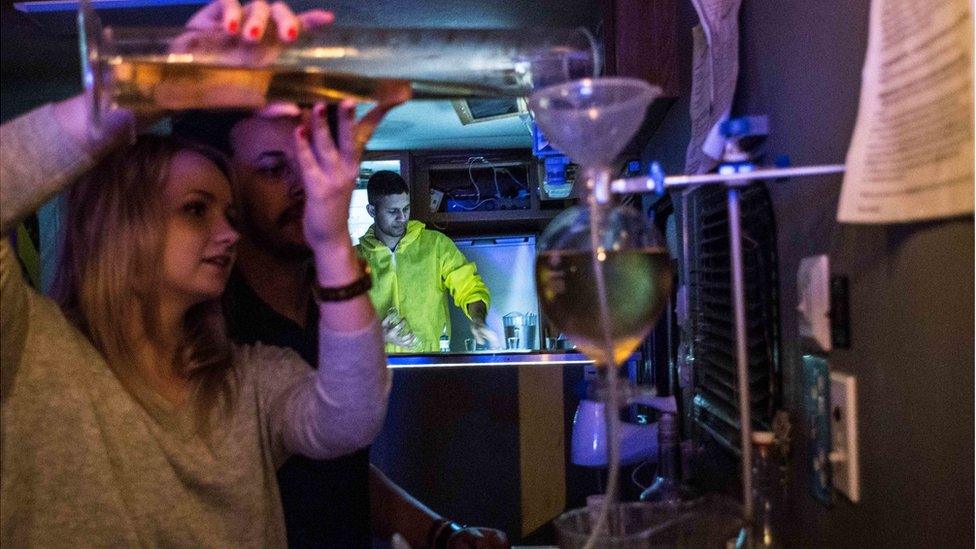
Customers mix molecular cocktails at Breaking Bad themed bar ABQ London
Mr Lyall's firm, Lollipop, founded the Breaking Bad-themed molecular cocktail bar ABQ London, where people don yellow jackets and goggles, and mix their own drinks.
Mr Lyall claims that the bar was the world's first "inspired-by concept bar" when it launched in 2015.
He says there is a difference between concept bars and themed bars - themed bars focus on decor, while concept bars are about providing a unique experience and transporting the customer to another world.
Minimising risk
Many themed cocktail bars and pubs were originally pop-ups, such as The Cauldron and ABQ London.
Over the past decade, pop-ups have been increasingly used by new businesses to test out ideas, says Lucy Shaw, editor of alcohol trade magazine Drinks Business.
Pop-ups are hospitality events put on for a limited amount of time. They are held in temporary locations such as a tent or an existing venue.
"It makes business sense to have a pop-up, before you plough hundreds of thousands of pounds into a business," Ms Shaw tells the BBC. "You want a litmus test, [you want] to test the water."
Small businesses make up over 99% of all businesses in the hospitality industry, which made up 9.3% (£161bn) of the UK economy in 2016, according to the ONS.
Matthew Cortland, The Cauldron's co-founder and chief executive, says pop-ups are attractive, because you can gain capital by promoting the venue concept online and pre-selling tickets.
The Cauldron has opened two pop-ups in the UK and one in New York. It is now seeking a permanent venue in central London.
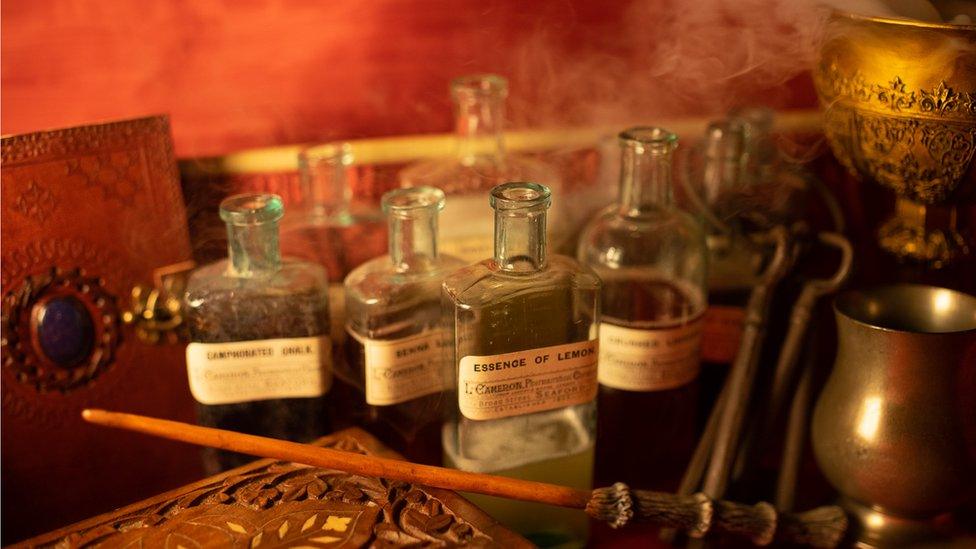
"Potions" available for mixing at The Cauldron
"We signed the lease with the last money in our bank accounts. We had just enough money to pay rent for one more month," he tells the BBC of the first pop-up in Dalston, London in 2017.
"But within one week of opening our doors we had broken even, and we sold out every day, so we extended the pop-up another month."
Lollipop says ABQ London sold £250,000 worth of tickets in just two days. There were 65,000 people on its waiting list before the bar opened.
Destination venues
Inception Group, which owns eight bars, two restaurants and one club in London, is unusual in that it did not begin as a pop-up.
Founders Charlie Gilkes and Duncan Stirling were told they were crazy by some when they decided to start Barts, a 1920s prohibition-style speakeasy bar, in a Chelsea residential building in 2009.
The pair, who are completely self-funded, couldn't afford a central London location, but they hoped their concept would be strong enough - a secret bar so exclusive that even the venue's address wasn't public knowledge.
Despite the overwhelming odds new businesses face, Barts succeeded, and bit by bit, the founders started other concept venues, often buying furnishings from car boot sales and eBay.
Each time they picked a failed venue location no one else wanted, then used profits from the successful venues to fund a new venture.
"We joked that it was 'the right postcode, the wrong street'," Mr Gilkes tells the BBC.
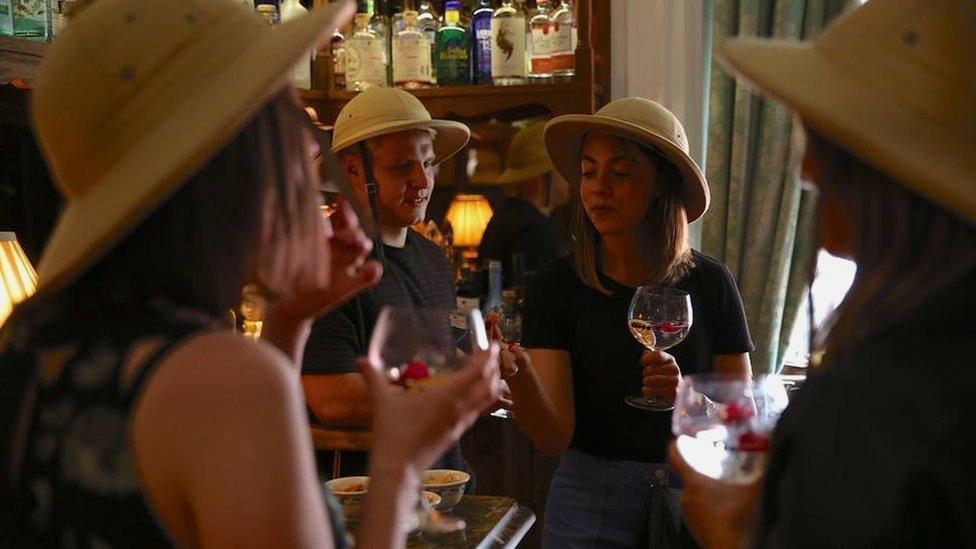
Customers don Victorian exploring gear at Mr Fogg's and go on a "gin safari" experience
It took six years before Inception Group could afford to open Victorian explorer-themed bar Mr Fogg's in St Martins Lane, a location in London's Covent Garden.
The firm beat more than 50 other bidders to win the venue's lease, and it says its concept clinched the deal.
In its first year of trading, the firm had a turnover of less than £500,000, but today Inception Group has a turnover of £20m, and employs 400 people, Mr Gilkes says.
"Before, people would drink, eat and then go to the theatre, and now, people want theatre while they're drinking and eating," says Mr Gilkes.
"The days of complacency are over. Just being able to open a bar and serve any old drink and expect it to do well is increasingly hard now, you've got to offer something more."
The Peaky Blinders Bar in Liverpool, which opened last year, told the BBC that being a destination venue had helped it to exceed its initial target.
"We attract a lot of tourists - visitor numbers are 1,000-1,500 a week all year round," said co-owner Rob Swire.
Criticism
While themed experiences and new drinks might be popular with millennials, some have criticised the quality of the drinks, which can be an acquired taste.
To combat this, bartenders at Lollipop-owned WW2 codebreaker-themed bar The Bletchley make personalised drinks for customers based on their tastes.
Another solution is to make simpler cocktails. Mr Gilkes says that London's cocktail bar-staff are now cutting down on the number of ingredients in each drink.
Some millennials, particularly city workers, feel bartenders are too slow when they make up cocktails.
In response, many venues have taken to pre-making batches of some drinks.
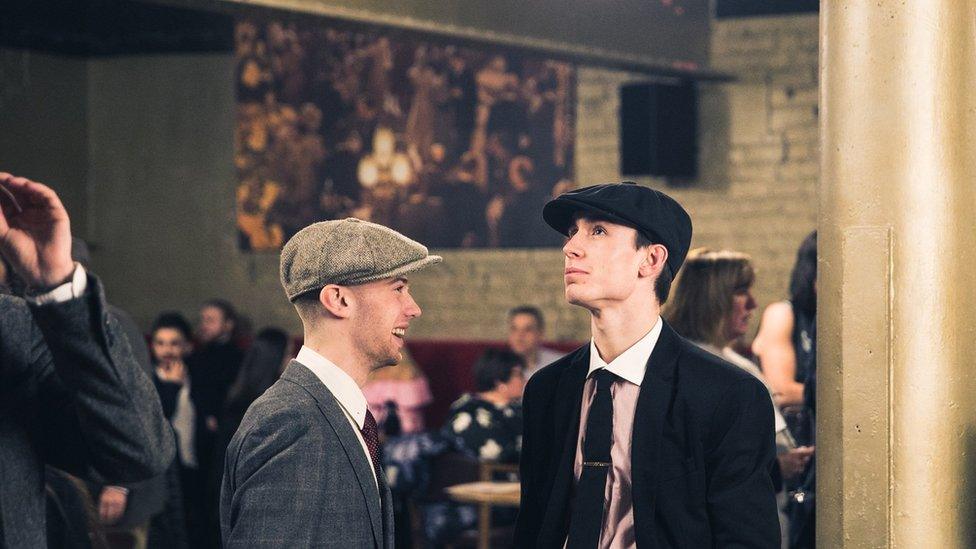
Customers enjoy dressing up in the theme at the Peaky Blinders Bar in Liverpool
And while pop-ups are a way for small businesses to minimise risk, not everyone is so keen on them.
"Local authorities and trading standards tend to be more lenient and they need to make sure they regulate pop-ups," Brigid Simmonds, chief executive of the British Beer and Pub Association (BBPA) tells the BBC.
Trade bodies say themed cocktail bars and pubs are on the rise and could stick around for a while, but other venues have failed for a number of reasons.
"There clearly is an appetite from both businesses and customers for themed venues. It's not for everyone, but clearly some operators can make a huge success of it," says Kate Nicholls, chief executive of trade body UK Hospitality.
"[But] pubs and bars that are struggling are doing so principally because of continually-rising costs."
- Published7 August 2018
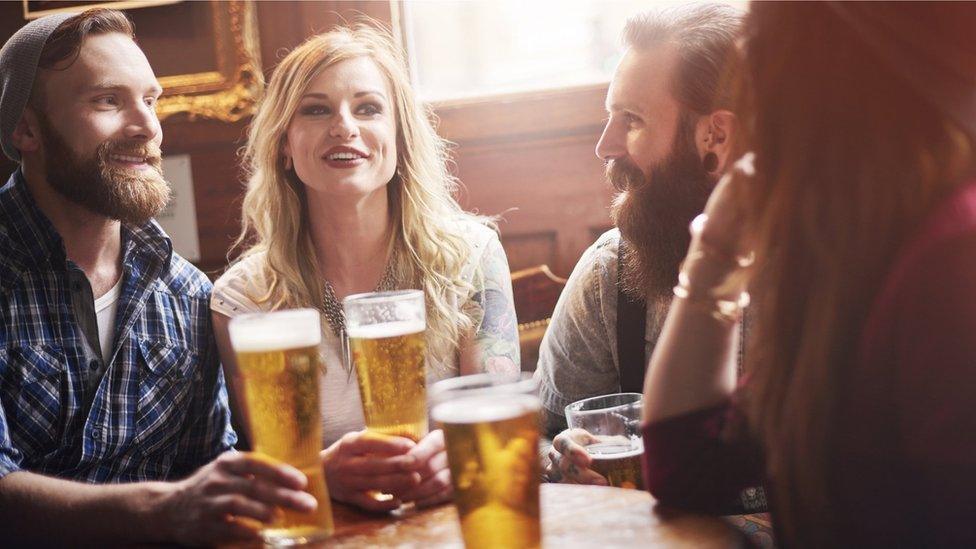
- Published1 August 2018
